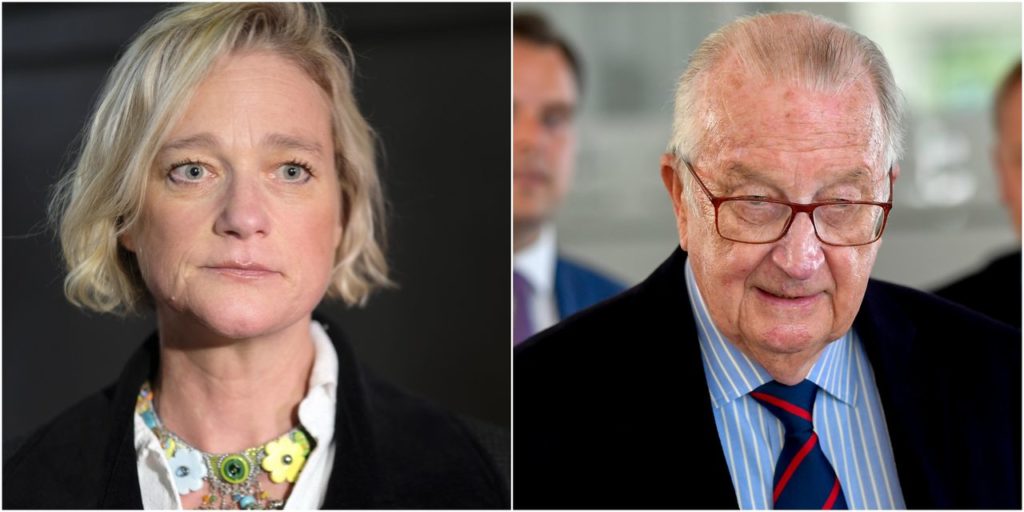The Cassation Court in Brussels is today expected to deliver its verdict on a case brought by the former King Albert II (photo, right), who is fighting a paternity claim by the 51-year-old artist Delphine Boël.
The court, the country’s highest tribunal against whose verdict no appeal is possible, is being asked to rule on a verdict by the Court of Appeal which ordered the former king, father of the reigning King Philippe, to obey a court order by giving a DNA sample which, Boël hopes, will prove the king is her biological father.
The Story So Far
Delphine Boël (photo, left) was born in February 1968 to aristocrat Sybille De Selys Longchamps, and recognised by her husband, industrialist Jacques Boël, as his child. However it later emerged that De Selys Longchamps had maintained a long-term relationship with the then Prince Albert, brother of the reigning King Baudouin and married to Paola Ruffo di Calabria. She claimed that her daughter had been sired by Prince Albert.
There then began a battle which has so far lasted 28 years, as Boël attempted to have her true paternity recognised by the Royal house. Contrary to the claims of critics, she declared to have no interest in claiming any of the rights of a member of the Royal family, including an allowance from the Civil List.
Albert, prince and later king on the death of his brother Baudouin, declined to comment for years, until Boël took the matter to court. There she encountered a major obstacle. Jacques Boël had officially recognised her as his child when registering her birth. By law, that makes him her legitimate father. It is possible to challenge that status in court, but there was a time limit, and Delphine had long seen it go past.
She persisted, however, the Constitutional Court overturned the law on time limits on the grounds of desuetude, allowing Delphine’s challenge to go ahead and essentially turning the case on its head.
The next step was a ruling by the Court of Appeal a year ago which recognised that her right to know her real father had primacy over Albert’s right not to be disturbed, and he was ordered to give a DNA sample to be tested to see unequivocally if he was related to Delphine.
Related News
- Royal extramarital love child: Belgium's former King Albert II could be forced to submit DNA test
- Case against King Albert over lovechild claims to begin on 23 September
- Brussels court rules former King Albert must pay daily €5,000 fine
The Verdict
Despite more legal challenges, in the end he had no option. He gave a DNA sample, and it lies sealed, together with the results of the analysis, in the possession of the court until today’s verdict is handed down.
That will go one of two ways: either Cassation will back the Court of Appeal, in which case the matter will have to be litigated again in another court in a different judicial area; or Cassation will allow the appeal court’s ruling to stand, in which case the envelope will be opened and the results of the DNA test made known to the parties.
There is one indication of how the verdict might go. The Cassation Court’s advocate-general, whose job is to issue an advice to the judges, came down in his opinion on the side of the appeal court, advising the bench to reject the appeal of Albert II. The full court does not always follow the advice of the advocate-general, but it does so more often than not.
If it does not, then Delphine’s case ends, and Albert’s DNA sample will remain unopened for good.
Delphine does have another avenue, however. She could, in theory, bring a court action to oblige either Princess Astrid or Prince Laurent, two of the offspring of the former king, to give a DNA sample in his place. That, if the action were successful, would then be used to establish a common parent. A case concerning Albert’s first-born, King Philippe, is impossible; as reigning monarch, he is exempt from the laws of the courts.
Whether Delphine would attempt such a course of action seems unlikely. Not only would it involve a re-run of the legal circus which has surrounded this case, it also would do nothing to satisfy what she has always claimed as her reason for taking action: to be recognised by her real father. Unless he is forced to by the court today, Albert will go to his grave continuing to refuse to give her the thing she wants most.
Alan Hope
The Brussels Times

